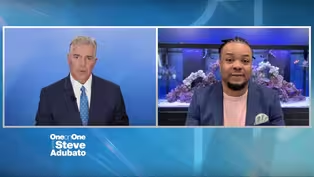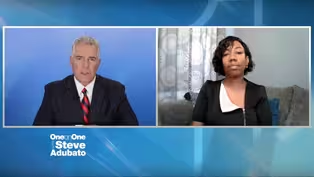One-on-One
Tips & Tools to Become a Confident Speaker and Presenter
Clip: Season 2024 Episode 2739 | 8m 56sVideo has Closed Captions
Tips & Tools to Become a Confident Speaker and Presenter
Steve Adubato and One-on-One Correspondent Mary Gamba talk with Matt Eventoff of Princeton Public Speaking & The Oratory Project, about his book, "Speak Fearlessly," and tips and tools to become a more confident presenter.
Problems playing video? | Closed Captioning Feedback
Problems playing video? | Closed Captioning Feedback
One-on-One is a local public television program presented by NJ PBS
One-on-One
Tips & Tools to Become a Confident Speaker and Presenter
Clip: Season 2024 Episode 2739 | 8m 56sVideo has Closed Captions
Steve Adubato and One-on-One Correspondent Mary Gamba talk with Matt Eventoff of Princeton Public Speaking & The Oratory Project, about his book, "Speak Fearlessly," and tips and tools to become a more confident presenter.
Problems playing video? | Closed Captioning Feedback
How to Watch One-on-One
One-on-One is available to stream on pbs.org and the free PBS App, available on iPhone, Apple TV, Android TV, Android smartphones, Amazon Fire TV, Amazon Fire Tablet, Roku, Samsung Smart TV, and Vizio.
Providing Support for PBS.org
Learn Moreabout PBS online sponsorship(upbeat music) - Recently, along with my colleague Mary Gamma, over on our sister series "Lessons in Leadership," we spoke to a gentleman by the name of Matt Eventoff, who's with the Princeton Public Speaking and Oratory Project, talking about his book, "Speak Fearlessly," all about tips and tools to become a more confident public communicator.
It never goes out of style.
Public speaking is always seen by folks as scary.
How can I get up there and speak confidently?
Well, Matt talks about that, and that's why we wanted to share that message with you.
Matt Eventoff, Princeton Public Speaking and Oratory Project.
Good to see you, Matt.
- Wonderful to see you.
Thank you so much, Steve.
Thank you so much, Mary.
- Hey, listen, Matt, talk to us about, what is the Oratory Project?
- The Oratory Project is an interesting collaboration that I have with a former student at Princeton University who now runs an amazing organization down in South Texas called the College Scholarship Leadership Access Program, run by Thomas Garcia.
He was a student at Princeton, where I served as the resource at Princeton University for their public speaking program called Speak With Style, which was a student-run organization.
And I was a resource there for 10 years.
Thomas and I really hit it off.
And the idea was, when COVID first hit, to bring resources to children in underserved communities to help them find their voices, and offer those resources for free.
- Mary, does that sound familiar?
- Oh, it does.
And it sounds so near and dear to our heart, for sure.
- For for 22 years, we ran a program called Stand and Deliver as leadership and communication tools for inner city youth.
Disproportionately, young men and women in Newark.
Mary ran that program.
I was honored to found it.
And we did it for a lot of years.
Now the Board of Education is running it through the schools.
But Matt, we share that commitment to helping young people find their voice.
But real quick on this, as a student of public speaking, you know it's been my world.
My first book, 2001, Mary, "Speak from the Heart."
Thank you, Simon & Schuster.
And every book since then- - I have it.
- has been... You have it?
- I do.
- Oh, you're the one.
So here's the thing.
I know he got it on eBay for a buck and a half.
But here's the thing.
Every book, every seminar, every article, everything I've ever done has been this obsession with public communication.
That's for me.
Where does yours come from?
- It's interesting.
My journey in communication actually started when I was 11 years old.
I was a young man.
I was a little bit different than other kids.
And I used to ride my bicycle through my neighborhood.
I grew up in Toms River, and I used to ride my bicycle through my neighborhood and other neighborhoods listening to, anyone on this show still remembers, a Walkman.
Traditional Walkman with a cassette tape.
And I received a cassette tape of Iron Maiden's first live album, "Live After Death."
And at the beginning of that album was Winston Churchill giving one of his most famous addresses of all time, "We Shall Fight on the Beaches."
And when I first put that tape in and I heard that voice, every hair on my body stood up.
And the electricity I've felt run through my body was something like I've never felt before.
And I became a Churchiphile at that point.
I just became obsessed with everything Winston Churchill.
Became obsessed with digesting everything that Winston Churchill produced, everything that Winston Churchill said.
That was obviously pre-YouTube.
It was very hard to get any kind of video.
I couldn't find any video, but anything I could find on audio, anything I could read.
And it just became fascinating to me how one human being could change the course of history with their voice.
And although my life's taken many twists and turns, as most of ours have, in a career, that really was an anchoring point.
And it became fascinating to me that through a mix of communication and through messaging, that a man who had a checkered political career up until that point- - Sure did.
- Not always the most popular guy in Britain, was able to save the Western world.
In many ways, through his voice.
- Yeah.
And you hit it on the head, Matt.
With the voice as such a powerful engine, right, we can get messages across to people, we can connect with people.
Why are people so afraid of public speaking?
Where does that fear come from?
And what can we do to overcome that fear?
Because really, without sharing through voice, people cannot hear our messages.
- I think we all suffer from...
I certainly do, and that's something.
I've always been nervous before crowds, and I've been doing this now for close to 22 years.
And it's a fascinating conundrum that most people face.
I think it's just very odd for a person to be up in front of other people, and they are the only one verbally communicating.
I think one of the barriers is people don't realize that you're still having a conversation, even if someone is not verbally responding.
They're responding through nonverbal communication.
They're responding through facial gestures.
They're responding through listening, through intent focus, as you're illustrating right now, Mary and Steve.
- Yeah.
And I'm smiling because Steve and I always say to anyone that comes to us and says, "I'm really afraid of speaking in public," where we say to them, "Are you afraid of having a conversation?"
And if you change your mindset and see that as a conversation as compared to a presentation, which takes us back to like the third and fourth grade when you had to stand up and you're fumbling with your notes and papers.
So if you see it as a conversation.
That's why I was using my body language to say, yes, that is definitely it.
What most people don't realize is when Dr. Martin Luther King gave his "I Have a Dream" speech, he had given portions of that speech at different times in churches throughout the South.
For quite a while, not that speech.
But it wasn't that he just woke up one day and gave a speech.
He spoke all the time.
Winston Churchill spoke all the time and practiced all the time.
There are tomes written about the preparation and practice that Winston Churchill put in to be able to communicate the way that he did.
Malcolm X, the same thing.
John F. Kennedy, the same thing.
If you look at any great leader who communicates well, they don't just wake up and communicate effectively.
It's an art, as anything else.
To something both you and Mary said earlier, I think that's something else that's really a barrier for people, is they don't understand that.
I believe, obviously, there are some people who are born great at different disciplines.
And they are the anomaly, and they are 1 of 1,000 or 1 of a million or whatever that number might be- - Wait, hold on.
But Matt, they don't get better by just being that.
That's like saying Michael Jordan was born with extraordinary skills.
Yeah.
And he practiced constantly.
So you may be born with it, but to improve and get better, it just doesn't happen automatically.
Go ahead.
- And Michael Jordan's a great example, right?
And my facts might be wrong here, but Michael Jordan was left off of either his sophomore- - He played, went out for varsity as a sophomore and was cut.
- So I think, I mean- - In high school.
And really, the impetus behind "Speechless" and Speak With Style books is that you might be born in different circumstances than somebody else, but everybody has a voice.
Everybody has a voice.
And if you can learn how to hone that voice, utilize that voice, and articulate, you'll have a leg up in whatever it is you choose to do.
no matter what your circumstances are.
Hey, Matt, thank you for joining us, my friend.
We appreciate it.
Thank you, Steve.
And thank you so much Mary.
- You got it.
Thanks, Mary.
And I'll be right back after this.
- [Narrator] One-On-One with Steve Adubato is a production of the Caucus Educational Corporation.
Celebrating 30 years in public broadcasting.
Funding has been provided by The Russell Berrie Foundation.
Making a difference.
PSEG Foundation.
Kean University.
Hackensack Meridian Health.
The Fidelco Group.
NJM Insurance Group.
Valley Bank.
New Jersey’s Clean Energy program.
And by Robert Wood Johnson Foundation.
Promotional support provided by Northjersey.com and Local IQ.
And by BestofNJ.com.
- (Narrator) Life is full of changes.
At Hackensack Meridian Medical Group, we're ready for them.
If you have a cold or chronic illness, our five star doctors can treat any ailment.
Whether you're starting recess or retiring, we're prepared with pediatric and adult specialists.
And if you just moved here, we are in your neighborhood.
You now have access to a health team thousand strong.
So no matter what or when, we're ready.
Nelson Mandela School in Newark Opens with a New Mission
Video has Closed Captions
Clip: S2024 Ep2739 | 9m 38s | Nelson Mandela School in Newark Opens with a New Mission (9m 38s)
This Entrepreneur Is Helping Survivors of Gun Violence
Video has Closed Captions
Clip: S2024 Ep2739 | 9m 44s | This Entrepreneur Is Helping Survivors of Gun Violence (9m 44s)
Providing Support for PBS.org
Learn Moreabout PBS online sponsorship
- News and Public Affairs

Top journalists deliver compelling original analysis of the hour's headlines.

- News and Public Affairs

FRONTLINE is investigative journalism that questions, explains and changes our world.












Support for PBS provided by:
One-on-One is a local public television program presented by NJ PBS

